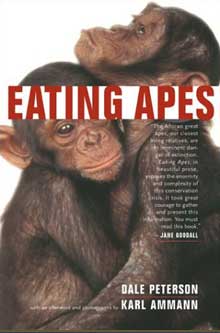
Eating Apes
Berkeley: University of California Press, 2003
This is surely among the most difficult and disturbing books I’ve ever written, but I felt I had to write it because no one else would or could. I say “disturbing” because it is the grim story of how humans are killing and eating endangered great apes for food in Central Africa. The cliché about Africa is that everyone is desperate and their desperation explains and excuses everything. But the story is not about hunger; it’s about choice. Chimpanzee and gorilla meat is sold at a prices higher than beef or pork in the big cities of Central Africa because it’s a luxury item. In doing my research for this book, I traveled into Central Africa, met and interviewed ape hunters in the forest, explored the big city meat markets, experimentally purchased gorilla and chimp meat, and visited a couple of restaurants serving “bush meat” (wild animal meat of all sorts). Having tried python and porcupine and who knows what else (but not primates), I am now a contented vegetarian. If you’re interested in the story of bush meat, this is, I am convinced, the best single introduction to the subject.
The University of California Press published Eating Apes as part of their cuisine series (food and culture), and I wrote it with that series in mind—including, for example, recipes—and it features the award-winning photographs of photojournalist Karl Ammann. Because it touches on the very sensitive issue of cultural food preferences, I asked a number of Africans with first-hand knowledge of the subject to review and critique the typescript. Perhaps the comment of one reader, Benis Egoh, was typical: “Not everyone will like this, but it’s all true.”
Eating Apes was named the Best Book of the Year by The Economist and Toronto’s Globe and Mail, and a Top Science Book of the Year by Discover magazine. It’s been translated into German and Japanese.
Reviews And Comments
"Eating Apes is a beautifully written book about an ongoing tragedy of global significance."—Edward O. Wilson
"Peterson is never shrill, and rarely does his tone become emotional; he does not overwhelm readers with evidence, yet his evidence is extensive."—Publishers Weekly
"The issues are not only more complex; they are also both fascinating and… deeply disquieting. It is a tribute to this book, and no doubt a long-overdue reward to the man who inspired it, that it explains them so well."—BBC Wildlife
"Eating Apes is by far [Peterson’s] best work to date: It has breadth and depth; the writing is crisp, clear and engaging."—The Globe and Mail
"Informative, clear, and precise…"—International Herald Tribune
"A fascinating account… An absorbing mixture of biography, biology, anthropology, politics, economics and ethics."—Nature
"Burns with fierce outrage backed by cold, calm cultural and economic analysis."—Seattle Weekly
"Riveting … deserves a wide public."—Washington Post
Eating Apes by Dale Peterson
| BUY THE BOOK | ||||||
|
|
||||||
Chimps vs. Humans: How Similar Are We? »From The Dr. Decker Weiss Show. Original Air Date December 16, 2013. It is a scientifically accepted fact that humans evolved from a common ancestor with chimpanzees, but our similarities and differences are not what many people think. Animal science expert Dale Peterson, PhD, explores the genetic link between the two species and explains the similarities and differences. |
Free From Harm: Make your food choices matter »FreeFromHarm.org's Exclusive Interview with Author Dale Peterson. |




